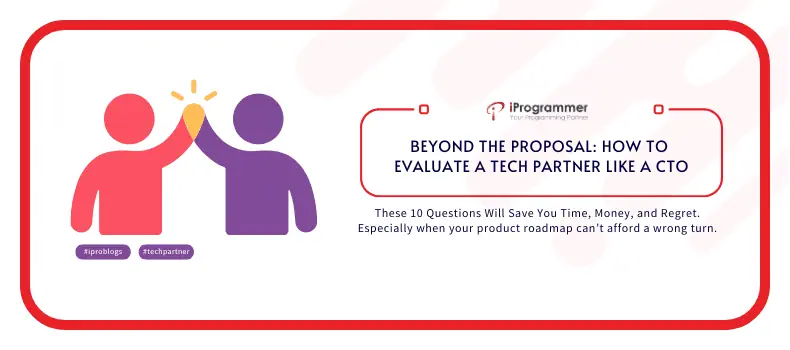Thinking of Outsourcing Tech? Ask These 10 Questions to Make Smarter Long-Term Decisions
Outsourcing isn’t what it used to be.
It’s no longer just a cost play or a way to move faster. Now-a-days, it’s a strategic decision—one that directly shapes product quality, engineering momentum, and your ability to adapt as your business grows. With tighter timelines, more complex architectures, and rising user expectations, the stakes are higher—and the margin for misalignment is thinner.
That’s why successful companies don’t treat outsourcing as a transaction. They treat it as an extension of their core team. They ask sharper questions—about process, ownership, accountability, and scale. In this blog, we explore why outsourcing continues to be a powerful lever for product teams—and the 10 questions that can help you choose the right partner before you commit.
Why Outsource Tech in 2025?
As budgets become tighter, product cycles become shorter, and the tech stack becomes more fragmented, using capabilities with the appropriate partner can drive massive leverage.
Done rightly, outsourcing enables you to:
- Tap expert skills without the headcount cost.
It can take months to hire in-house personnel with the right mix of skills—particularly for AI, backend, frontend, DevOps, and compliance. Outsourcing accelerates that process. - Stay focused on product and market, not recruitment cycles.
Instead of spreading internal bandwidth thin across hiring, onboarding, and technical debt, founders and product leaders can concentrate on what matters most: strategy, vision, and customer feedback. - Move faster, with more flexibility.
A capable partner can scale up or reboot fast as priorities change—whether validating a new feature or expanding into a new market. - Mitigate risk—technical and operational.
From architectural mistakes to compliance oversights, an experienced outsourcing team has battle-proven processes that can sidestep expensive rework. - Fill capability gaps without sacrificing quality.
Outsourcing isn’t about lowering the bar. Done on purpose, it improves quality—by adding experienced engineers, domain expertise, and a systematic delivery methodology.
10 Important Questions to Ask Before Outsourcing Tech
Before you commit to a partner, these ten questions can help you surface not just technical capability—but strategic alignment, maturity, and long-term fit.
1. Do they understand your business—not just your codebase?
Technical skills are table stakes. What’s more important is whether the team is able to put those skills in context for your industry, your user behaviour, and your product vision. A good outsourcing partner doesn’t just react to tasks—they have a point of view. They must be able to push back on assumptions, propose smarter architectures, and make trade-offs that align with your objectives—not merely the spec sheet.
2. How do they manage communication across time zones and cultures?
Availability and clarity are not the same. Particularly in remote teams, ad-hoc Slack messages and constant calls do not take the place of formalized collaboration. Mature partners instill communication rhythms—weekly demos, written progress, explicit escalation channels. And they account for time zone differences in their process, not just their calendar.
3. What does their onboarding process actually look like?
If kickoff is a sprint to code, that’s a warning sign. A seasoned team will spend time getting to know what you have now, your customers, and the business rules. They’ll ask for access to more than just your GitHub—they’ll want to understand product strategy, usage patterns, stakeholder roles. The first sprint shouldn’t be about shipping fast; it should be about getting the foundation right.
4. Can they scale with your vision?
Your requirements today may be limited—but what if the product takes off? Can the same partner scale talent in a hurry, bring on specialized skill, and enable new geographies or technologies? Don’t hire headcount. Measure how they will scale with you—with engineering leadership, DevOps maturity, and architecture vision.
5. What’s their approach to code quality and documentation?
Demo day success can cover up bad internals. It’s not the first performance that matters, but how the code grows old—through teams, audits, and pivots. Ask them about their review cycle, testing processes, and how they ensure documentation isn’t just written but updated. Quality isn’t perfection; it’s maintainability and understandability when you need to move fast.
6. How do they handle IP, security, and compliance?
Especially in 2025, data security and regulatory compliance are non-negotiable. If your outsourcing partner isn’t proactive about IP protections, secure data handling, and compliance with frameworks like GDPR or SOC2, you’re taking on silent risk. Seek out explicit documentation, NDAs, and a security-first mindset—not paper policies.
7. What’s their track record with long-term support and handover?
Most outsourcing partners excel at early delivery—but falter when the product matures, scales, or must be transferred. Ask how they manage post-launch support. Do they have handover plans? Will they co-own the roadmap or just react to tickets? The real test of partnership often begins after go-live.
8. Who exactly will be working on your project?
It’s easy to be impressed by senior leadership during a pitch—but who actually writes the code? Ask for visibility into the team structure, seniority mix, and delivery ownership. A quality partner won’t mind introducing you to the project leads, architects, and day-to-day contributors. Transparency now prevents surprises later.
9. What happens when things go wrong?
Each project encounters friction. Deadlines are missed. Features are re-scoped. The question is how the partner reacts. Do they own up, call in problems early, and fix together? Or do they fall back on contracts? Find evidence of how they’ve navigated setbacks—and how they preserved trust while doing so.
10. What do their past clients say—after 12 months?
Not just testimonials at launch. Ask for conversations with clients who’ve worked with them over time—across versions, pivots, and leadership changes. Long-term feedback tells you how the partner handles evolution, not just execution. Do clients stay for multiple cycles? That’s often the clearest sign of fit.
Outsourcing isn’t a transaction. It’s a relationship that touches your code, your customers, and your company’s momentum. The right questions reveal the difference between a capable vendor and a strategic partner. They uncover foresight, culture, and reliability—the things that rarely show up in a proposal. Choosing well takes more than a checklist. It takes clarity on what kind of partner you actually want beside you for the long haul.
Why Choose iProgrammer
At iProgrammer, we build more than outsourced teams—we build long-term engineering partnerships. With more than 15 years of experience serving startups and businesses, we offer organized implementation, technical acumen, and complete transparency to each engagement.
Purpose-Built Teams
From cloud and technical architects to QA, UI/UX, and cloud experts—each team is built to your goals and scale stage.
Agile Delivery with Full Visibility
We use a structured SDLC with constant feedback, sprint tracking, and transparent channels of communication. No surprises—just measurable progress.
Flexible Engagement Models
Whether you need an ad-hoc rush, a full-time offshore team, or blended support, we have models to suit your timelines and working style.
Pre-Vetted, Cross-Domain Talent
Our 100+ certified engineers span web, mobile, cloud, and DevOps—prepared to fit into your roadmap with urgency and dependability.
Working with us feels like an in-house extension—only more scalable, more accountable, and ready from day one. Let’s talk about what your team could look like.









